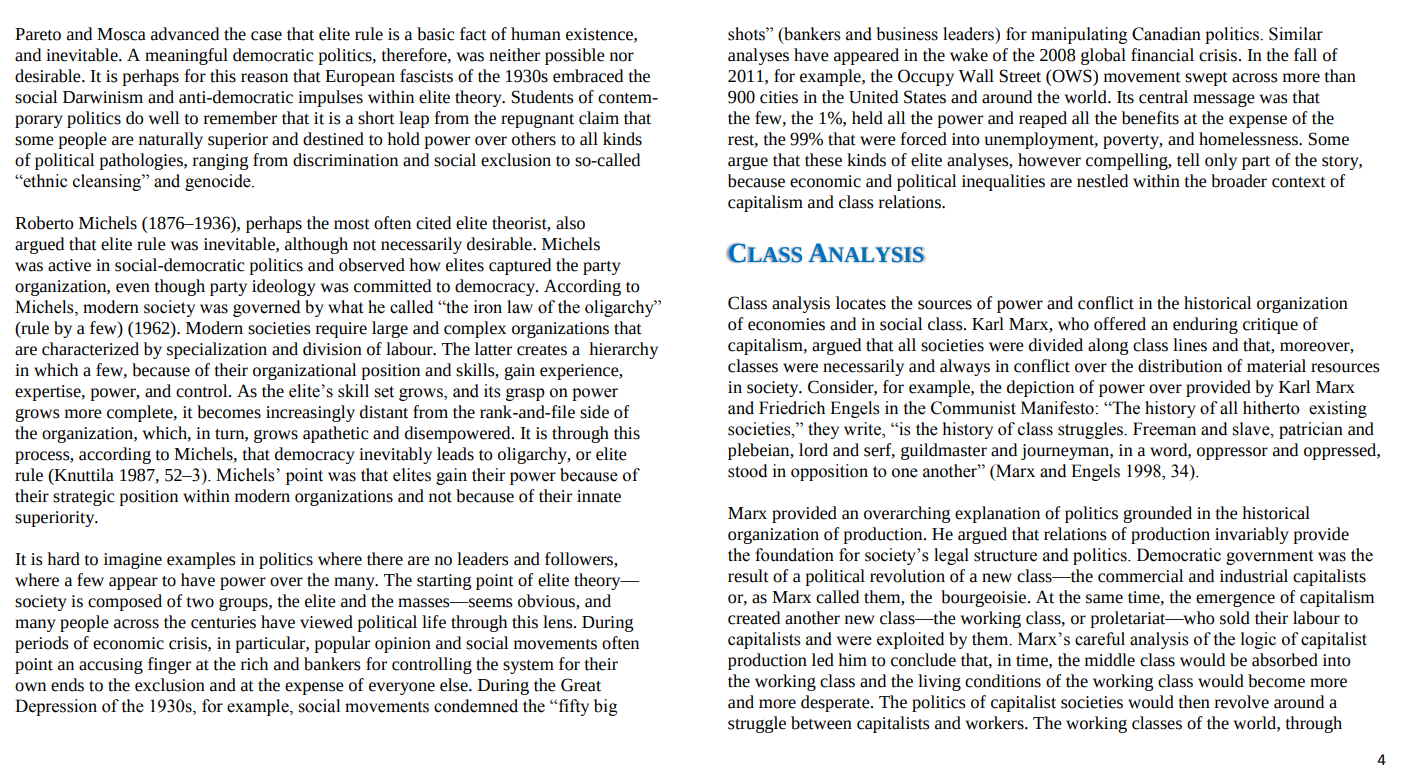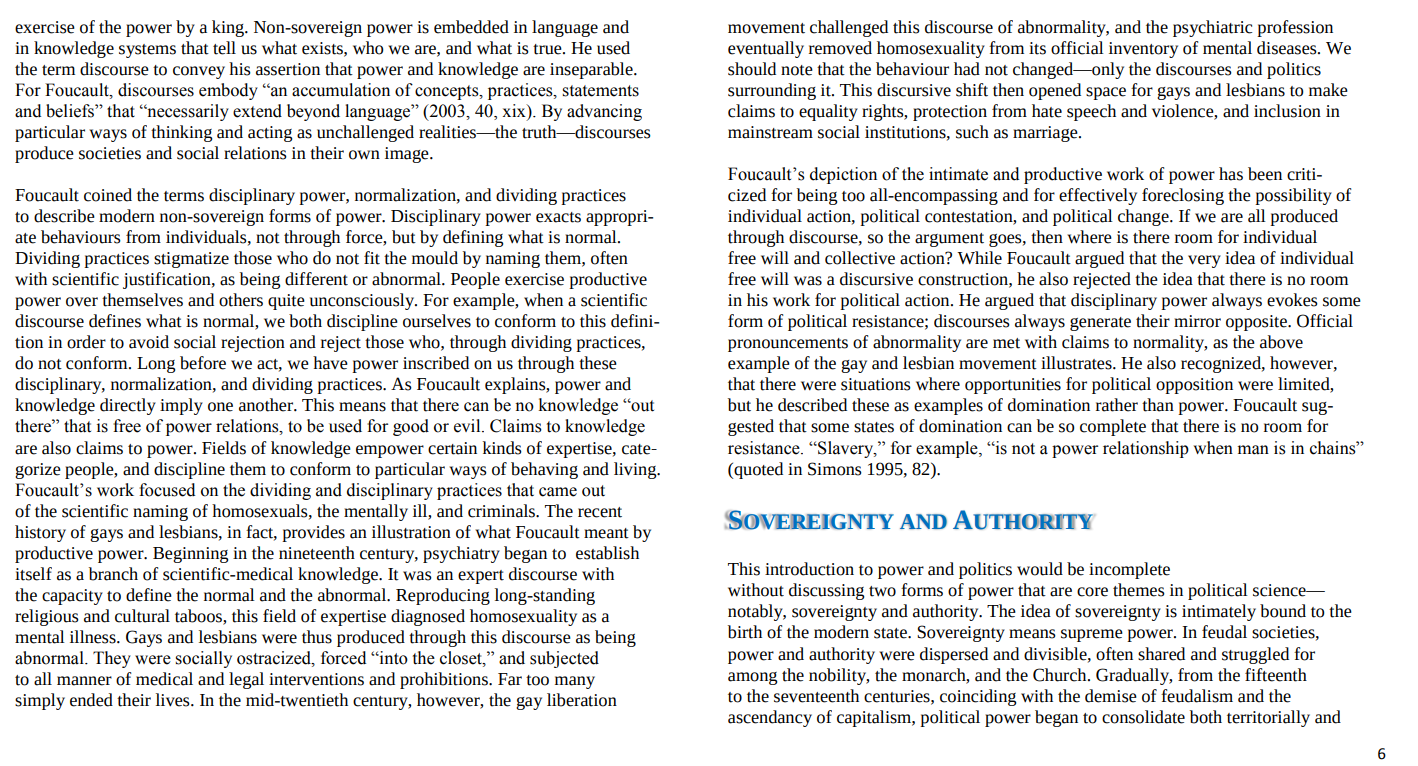This small essay by Janine Brodie called “Power and Politics” has several other issues, but their most frustrating one is their outright DISMISSAL of Marxist class analysis for the stupidest reasons. Economic determinism? I guess if you yearned to softly dismiss marx by misrepresenting him.
God I fucking hate poli sci majors.
The previous page:

The next one:

I’m not the brightest crayon in the box but is it just me or does Doctor Brodie somehow make politics and power some sort of vague, unsolvable mystery? Like fr I don’t want just an echochamber of nodding heads plz help am I in the wrong?
I need help putting words to my issues with it.

My issue with figures like Weber and Foucault and Bourdieu is that, to varying degrees, they don’t just obfuscate class analysis but they actively mystify it by turning it into something abstract.
One of the greatest ways that people, whether big figures in academia or the media or just laypeople, strawman Marx is by beginning from the presumption that Marx sought to detail every little thing in political economy and then they proceed to do things like going “Aha! Marx was a fool for he did not account for the individual who draws exactly half of their income by being employed and the other half from owning some sidehustle business. He doesn’t even have a name for a person who straddles his so-called classes. Ridiculous!” or “Aha! Marx failed to account for the fact that power exists outside of people’s relationship to the means of production. How shortsighted of him!”
But the thing is that Marx took a systemic analysis. He wasn’t trying to create special little titles for each minor graduation between proletariat and petit-bourgeoisie/bourgeoisie. He wasn’t particularly concerned with how an individual might straddle these categories because ultimately it doesn’t bear much relevance to his analysis whatsoever. Likewise he didn’t go into great detail about gender relations under capitalism because he was occupied with the system itself and in writing volumes of Capital.
I don’t think that Marx ever argued that his analysis of capitalism was the Theory of Relativity for political economy. When it comes to sociological matters there’s always going to be edge cases and odd little intricacies that cannot be accounted for in the way that a hard science can (mostly) do. That’s because people are complex and societies are astoundingly elaborate. There’s plenty that can be gained from understanding things outside of what Marx wrote and even from looking beyond Marx’s model, sure, but at the end of the day class conflict is the engine of society and it determines how we structure our lives and our world.
Marx and Engels did concern themselves with gender relations under capitalism, in fact they wrote about it at length.
Sure but tbh they didn’t go into it in great detail as they did with capitalism or to the extent that later gender theorists did.
I guess? Gender relationships crop up all through Marx and Engels work, in many cases, substantial time is taken to understand the nature of these relations. Marx doesn’t go into gender theory because gender theory wasn’t really even a thing at the time, and wouldn’t be until developed later by students of Marxist social theory, though then thrown to the cobbles by Stalin (one of his real big fuck-ups).
stalin did not throw gender to ‘the cobbles’. Inflammatory language aside, He was mostly concerned with the National Question and Soviet Economic development.
https://www.marxists.org/reference/archive/stalin/works/subject/women/cccp.htm
https://www.marxists.org/reference/archive/stalin/works/subject/women/jauccf.htm
His referenced works in the marxists internet archive do not seem to whitewash the role of women in the revolution. If that isn’t enough, Women in the USSR under his tenure also experienced massive economic and political emancipation.
Lenin liberated women, stalin followed. there were some reactionary steps back, but such is usually true in all socialist countries in order to maintain stability and popularity.
Thanks for the reading materials I will follow up on it!
i have been graced with a ReadFanon post
thank you very much, this put it into very good words my issue of just dismissing marxist class analysis based on a dogmatic reading of him.